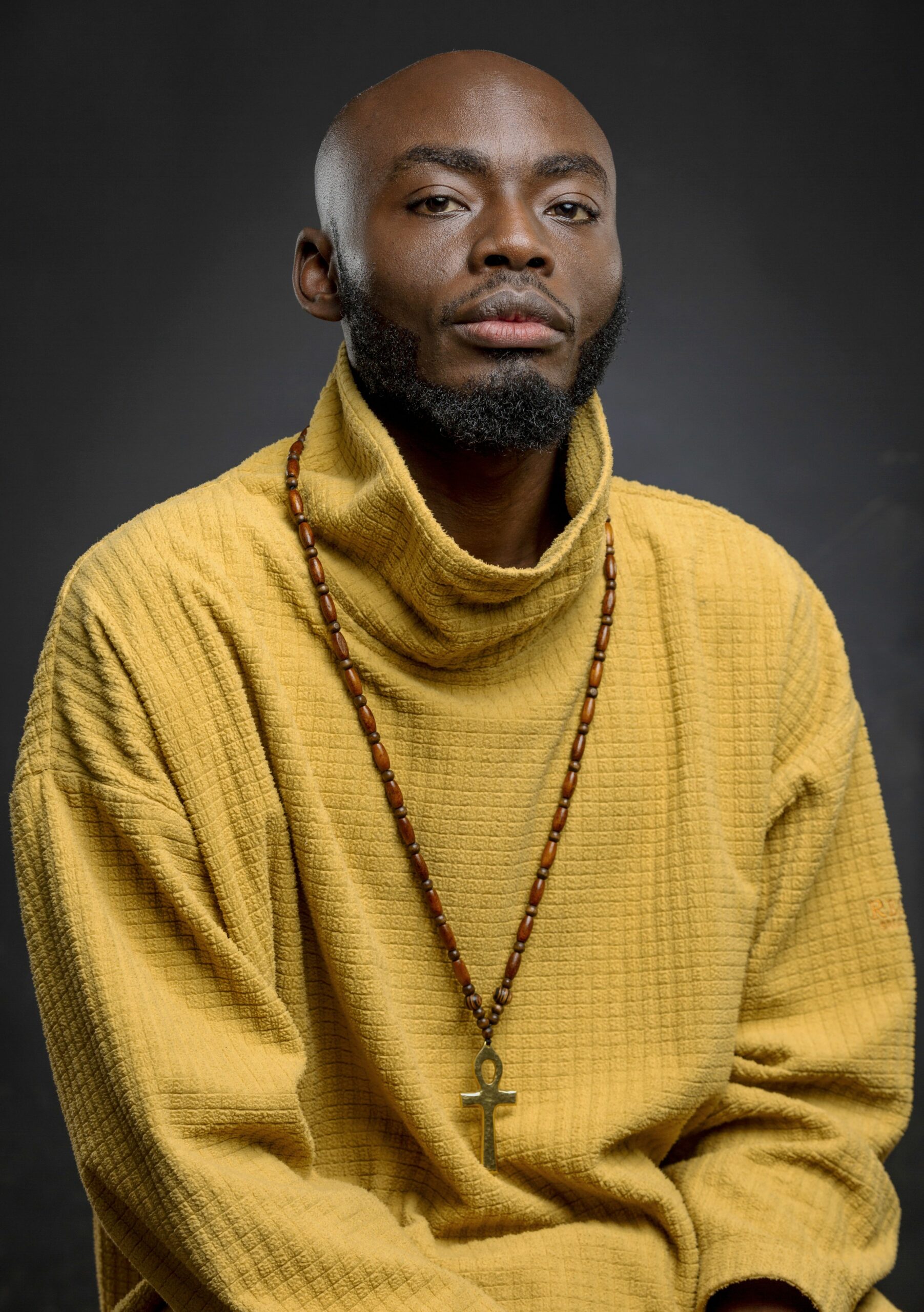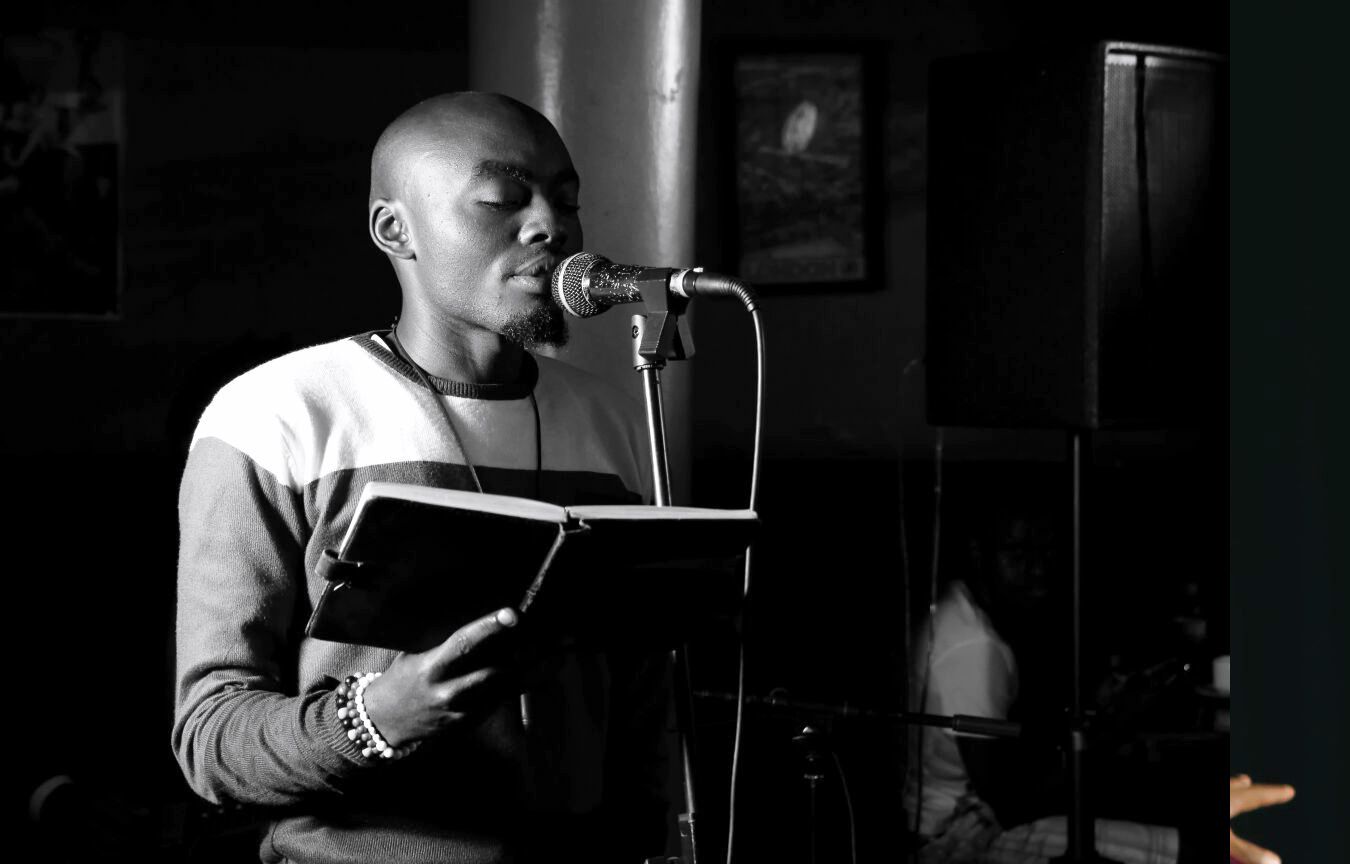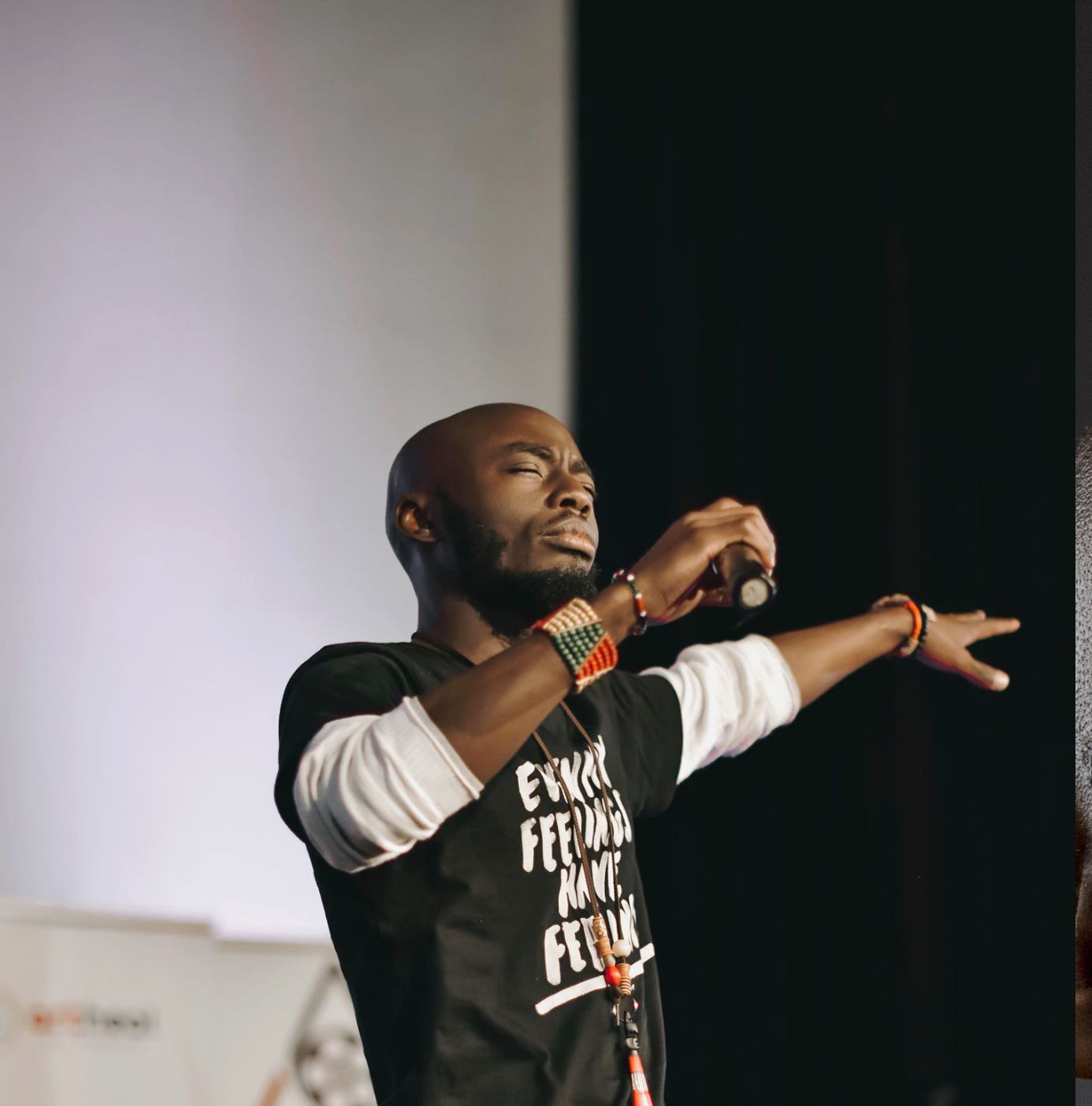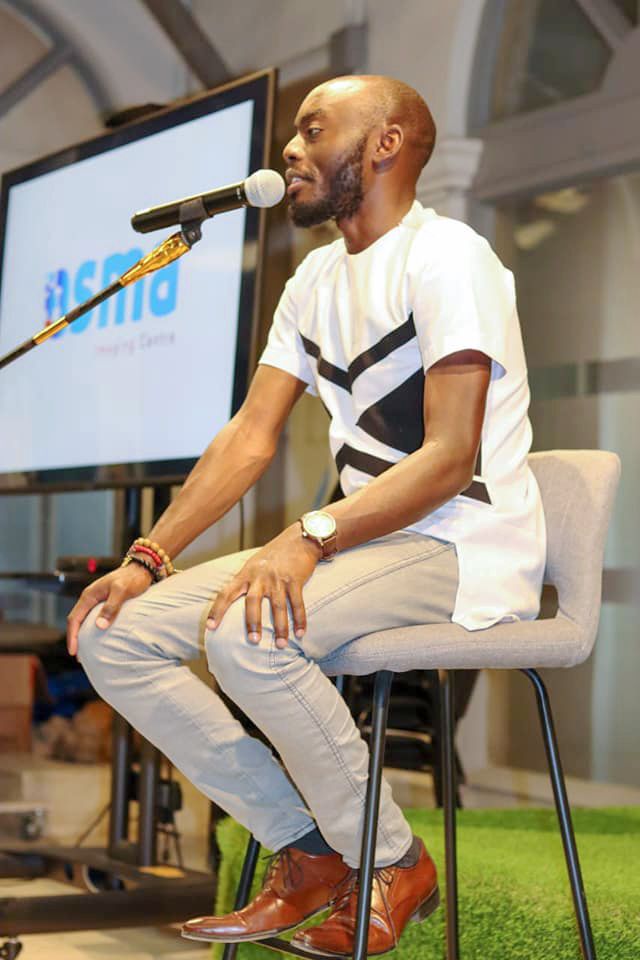Features
This Kenyan Poet turned Personal Tragedy into a Conversation about Toxic masculinity

By Arekpitan Ikhenaode, bird story agency
Kenyan poet and therapist Onyango Otieno has set out to free men from what he regards as a cage of toxic masculinity; where men are taught to repress emotions, belittle women, and think nothing of abuse. Identity and cultural beliefs are in his crosshairs.
**
Throughout his childhood and adolescence, Onyango Otieno witnessed violence. His father physically and emotionally abused him and his mother as a child. Life at home was unpredictable. Young Oyango did not know when a fight would start, what would happen, or how it would go.
Onyango vividly remembers one day when his father beat him, sprayed him with kerosene, and lit a match. By age 15, he was running away from home, skipping school, shoplifting, and stealing clothes and money. There were long periods without washing.
At 20, he was sexually assaulted. As a result of his ordeals, he also struggled with anxiety and had trust issues.
Today Onyango is drawing from that trauma, the pain he felt, the questions he had, and the scars he lives with, to inform his work as a trauma therapist, poet, activist, and podcaster.
“I speak because freedom is living without fear. The things I’ve gone through are very human. Many others have gone through these things but are afraid to speak. Many want to be understood, but they don’t have the language. They see me as a mirror, a place to find the language to express themselves,” he said.
The violence he experienced would shut him down, but as a child, Onyango was taught that men were not supposed to cry or show weakness. He was taught that it wasn’t right to build or marry before an elder sibling. And in the Nollywood films he watched, the women lacked agency. They were supplicants and “below” the men, suffering and struggling to be heard. He saw the men around him make their feelings, thoughts, ideas, and actions more important, and how women had to make themselves smaller so men could feel big.
“I kept asking, ‘how is this supposed to be okay?’ I kept thinking, ‘If people I was supposed to trust treated me this harshly, how would strangers treat me? That’s how trusting became a problem for me.”

All this began to change on January 18, 2017. Onyango was 28 years old and life had never been bleaker. He was coming out of a toxic relationship, struggling to make rent, and had just lost two of his friends – one to suicide and the other to health complications. He got in the shower. Two hours later, he hadn’t got out.
“There was just a tiredness to life. I was feeling very heavy. I was thinking to myself, ‘why is life so hard?’”
Onyango thought about his friends. They were at rest.
“They were not having fights with their girlfriends or thinking of how to make rent,” he thought to himself. He began considering ending his life.
While entertaining the idea of suicide, Onyango felt like he was about to burst.
“I felt so much pain, so much that I felt like if I didn’t let it out, I was going to explode.”
With water dripping down his body, the tap still running, he rushed out of the bathroom and began, frantically, to type on his laptop. He made a Facebook post.
“Guys,” he wrote, “I’m depressed. I’m suicidal. And I know it looks like I’m always the strong one, but people like me break too.”
The reactions were supportive. Several people privately messaged him with their stories, stories that in many ways mirrored his. For the first time, Onyango realised he was not alone.
“How come many of us are going through the same issues and no one is talking about it? I began searching for information about mental health and suicide, and I couldn’t find African stories about these issues. So I said, ‘Okay, I will document my journey of healing.'”
For Onyango, writing became freedom. He began teaching himself to write effectively. He opened five blogs, all repositories for his thoughts and experiences with the world. Word after word, post after post, the Rixpoet was born.
For fuel, Onyango turned to the men who came before him.
“Reading about John Garang, Nelson Mandela, Steve Biko, Ken Saro-Wiwa, Thomas Sankara, those men in their liberation struggle taught me a lot. And I listened to Tupac a lot. He asked in *Keep Your Head Up*, ‘Why do we hate women?’ He was young, and he had that consciousness, so I thought to myself, `I’m not crazy to fight for justice around me.’”
While he taught himself gentleness, it helped him to be surrounded by men who were also gentle. Onyango reached out to his maternal uncles, who showed him love, let him cry, and held him while he did.
Onyango came to experience the kindness of his maternal grandfather.
“My grandfather was the kindest man I ever knew. When he died,” Onyango said, “it felt like I had lost a friend. He showed me love, as no man has ever shown me.”

Though he has learned from many men, Onyango admits that women have taught him to be the man he is today. From watching them care for husbands and children and parents, from watching them hold communities together, he learned to care for himself and to extend this care to others.
“I realised how important women’s labour is, even though it is never recognized.” For this reason, he says his work is proudly feminist.
Today, Onyango focuses his work on dissatisfaction with the status quo.
“I’ve seen how much of the trauma we are going through is intergenerational. A lot of how we see ourselves and the world is shaped by where we come from, and most of us didn’t grow up in healthy homes,” Onyango says.
“Most of us grew up in homes where silence was also a culture. We grew up seeing things shoved under the carpet – that’s how our parents have been solving their issues, that’s how the government has been solving them.”
“There are so many unresolved things in our political history, but the country has never come together to discuss a healing or reconciliation process. We are living with so much pain that’s harboured in our body, and that’s why we feel stuck,” he added.
The process of replacing the old with the new, trading things that cause harm for new ways that allow people to be full human beings – this is what Onyango calls cultural designing; planting seeds in people so they can begin to re-imagine themselves. All of nature keeps evolving and Onyango’s mission is to get culture to move along, too.
“The Latin root of the word culture comes from ‘cultivate’ and ‘care’; for the most part, we haven’t seen much care and gentleness around us. So, when we say ‘that’s our culture!’ even when it’s violent, we need to go back, dig deep and ask how we got here.”
To design culture, Onyango the Rixpoet, has leaned into different expressions. A multifaceted artist, all he does intersects with storytelling, connection, and healing – one whole thing.
As a trained trauma therapist who helps people deal with sexual abuse and childhood trauma, he runs a safe space and provides a community for men seeking healing.

“We have a WhatsApp group where we narrate our ordeals, and for many of these men, this is a first for them. After, I connect them to therapists I partner with, for counselling.”
In addition to curating this online community, Onyango also hosts the Afro-Masculinity Podcast, where he explores African masculinities and the complexities of identity.
With Skills and Kinks, a safe-sex space he co-founded, he talks about sex, sensuality, and sexuality. With Fatuma’s Voice, which he also co-founded, he helps young people explore continental opportunities, solve social issues and express themselves through creative tools like art, music, poetry, and open discussions.
Through his work, Onyango is creating waves of change.
“There are people who privately message me because my words have helped them make better choices, have better relationships, and be better. There are people telling me they’re gentler with their kids, couples going for counselling, people screenshotting my stuff and taking it to WhatsApp groups and having conversations around them, even learning beyond the words I use – that’s what change looks like to me.”
Onyango is currently working on Poems to My Father, a book he hopes will get African men to “humanise” themselves, many for the first time in their lives.
“I want us to go deeper and see what’s inside. Many of us were broken by the emotional absence of our fathers. We have a lot to tell them, those alive or dead, but barely any space to do that. So, through the stories I shall write, I hope they can see themselves more clearly and start imagining the process of healing.”














